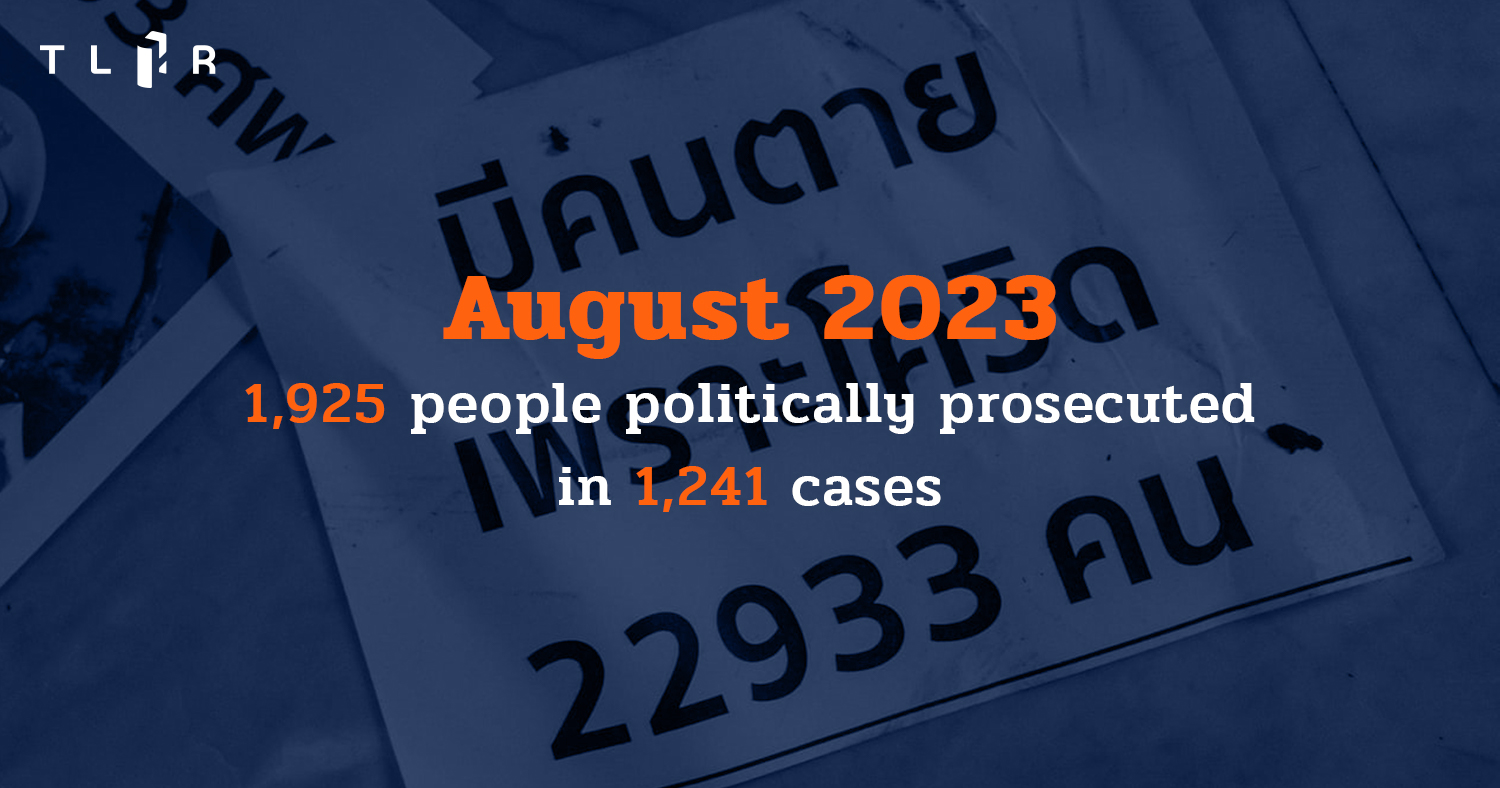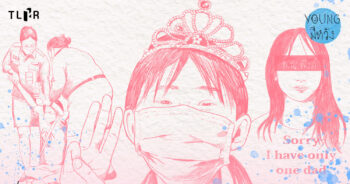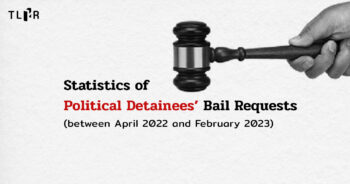August 2023: A total of 1,925 people have been politically prosecuted in 1,241 cases
*[Information as of 5 September 2023.]
In August 2023, prosecution of political expressions continued amidst the formation of a new government led by the Pheu Thai Party. There has been a slight increase in the number of both lawsuits containing lèse-majesté charges and those resulting from political protests. At the same time, the courts continued to hand down verdicts in cases arising from mass protests in 2020 – 2022, including at least 10 lèse-majesté cases and 11 Emergency Decree cases. Meanwhile, more people were placed behind bars pre/during-trial.
According to the TLHR statistics, at least 1,925 people have been prosecuted in 1,241 cases due to political participation and expression since the beginning of the “Free Youth” protest on 18 July 2020 until 31 August 2023.
Among this number are 215 cases involving 286 children and youths under 18 years old.
Compared to July 2023, this month’s statistics saw an increase of 7 people and 11 cases (only counting those who had never been charged before).
If we also include those who have been charged in multiple cases, there would be at least 3,909 instances of prosecution in total.
The prosecution can be grouped according to key charges as follows:
1. The royal defamation or “lèse-majesté” charge under Section 112 of the Criminal Code: at least 257 individuals in 278 cases.
2. The “sedition” charge under Section 116 of the Criminal Code: at least 130 individuals in 41 cases.
3. Charges of violation of the Emergency Decree: at least 1,469 people in 663 cases (since May 2020 when the first lawsuit against protesters and political activists was filed)
4. Charges under the Public Assembly Act: at least 163 people in 84 cases.
5. Charges under the Computer Crimes Act: at least 184 people in 204 cases.
6. Contempt of court charge: at least 36 people in 20 cases and insult of court charge involving at least 34 people in 10 cases.
Out of the mentioned 1,241 cases, 408 have been concluded, meaning over 833 cases are still ongoing at various stages.

5 more lèse-majesté lawsuits have been initiated, 10 more lèse-majesté cases have received court verdicts, and 7 more people have been detained at trial/appeal stage.
As far as we know, in August 2023, at least 4 people have been charged with lèse-majesté in a total of 5 cases. All have been filed by members of the Monarchy Protection group.
Among them, 2 cases stemmed from speeches delivered at protests during the parliamentary vote for prime minister and were filed by Arnon Klinkaew from the People’s Center for the Protection of the Monarchy. One of the 2 accused was Tanruethai ‘Pim’ Tanrat, an activist from Mok Luang Rim Nam group, who gave a speech at the ‘Respect My Vote’ protest urging the Senate to respect people’s voices in front of Bangkok Art and Culture Centre on 14 July 2023.
The other was Jiraporn Budpaket, aka ‘Auntie Nid’, a 74-year-old citizen from Nonthaburi who was accused of giving a speech at the ‘THE RETURN OF THAMMASAT’ protest at Thammasat University Rangsit Campus on 26 July 2023. She is considered the oldest person accused of the royal defamation law in the recent period.

There were also cases involving 2 Thammasat students, Kiattichai ‘Big’ Tangpornpan and Banja Apan, who were charged with lèse-majesté by police from Lumpini Police Station for giving speeches at the 3 September 2022 protest at Ratchaprasong Intersection. The two had previously been charged under the Emergency Decree as a result of the accusation by Rapeepong Chaiyarat, member of the People’s Center for the Protection of the Monarchy. These are Big’s 4th lèse-majesté case and Benja’s 8th.
Meanwhile, the Monarchy Protection group has also filed a lawsuit against an ordinary citizen at a police station in the South, forcing the accused to travel there in order to hear the charges. ‘Nattapon’, a 27-year-old Bangkokian, was accused by Songchai Nianhom, leader of the Monarch Protection Group, at Kho Hong Police Station, Songkhla Province, as a result of his tweet in 2022.
Another case involves Teeramet, an intellectually challenged man, whom, as per his request, Thale Noi Police Station, Phatthalung province, allowed to hear the charges in Loei, his hometown, instead. Upon reporting himself, he learned that the accusation was based on his TikTok post from early 2023. Teeramet will have to travel to Phatthalung in order to continue the remaining proceedings.

In the past month, the Court of First Instance has issued verdicts in at least 10 lèse-majesté cases, divided into 8 where the defendants pleaded not guilty, and 2 where the defendants entered a guilty plea.
Trial outcomes vary. Some defendants have been acquitted of all charges, such as “Patchara” and “Peter”.
Some, like “Tam” and “Sompon”, were acquitted of the lèse-majesté charge but convicted under other offenses, e.g. damaging others’ property, and received a suspended sentence.
Cases where the courts found the defendants guilty of lèse-majesté but decided to suspend the sentences include those of “Ramil and Ten” in Chiang Mai, and “Parinya” in Nongbua Lumphu, as well as the 2 cases where the defendants entered a guilty plea — “Arm” in Khampaeng Phet and the other case against “Sompon” where he spray-painted monarchy-related phrases in Pathum Thani.

On the other hand, defendants in 2 cases were found guilty of lèse-majesté and their sentences were not suspended: Thanatorn “Hongtae” in Chiang Mai and Sophon “Get”. In the former case, the defendant has been granted bail by the court during appeal, while the latter has not.
The Court of Appeals passed a verdict in 1 lèse-majesté case: that of “Udom”, a factory worker from Prachin Buri who was accused in Narathiwat in connection with his Facebook post. The Appeals Court Region 9 affirmed the decision of the Court of First Instance sentencing the defendant to a jail term of 4 years without suspension. Moreover, the Appeals Court denied Udom’s bail request. Consequently, he is now detained at Narathiwat Provincial Prison.
Hence, at least 7 people, as far as we know, are behind bars during their lèse-majesté trials, Wut (during trial by the Court of First Instance), Weha-Teepakorn-Warunee-Wat-Sophon (during appeal), and Udon (during appeal to the Supreme Court).

19 activists were charged in connection with APEC2022 protests, while defendants in 11 Emergency Decree cases were either acquitted or convicted by the courts.
In August 2023, the 19 activists who had received warrants from Phlapphla Chai 2 Police Station have begun to travel to acknowledge their charges. The warrants came from 2 lawsuits (1 person is involved in both lawsuits). The allegations are based on the protests taking place during the APEC2022 Summit, e.g., March for Phayu’s eye in Yaowarat and the demonstration against the authoritarian leaders who attended the conference. Both lawsuits cite violations of the Public Assembly Act as the main charges. Notably, the police only issued warrants summoning the accused now, even though the events took place more than 8 months ago.
Meanwhile, Huay Kwang Police Station has issued warrants summoning 18 activists and citizens to hear charges under the Emergency Decree and other laws for their involvement in the action calling for the removal of Naowarat Pongpaiboon from the Senate in front of the Ministry of Culture on 6 August 2023. The affected individuals are currently in the process of hearing the charges.
As for the Emergency Decree cases related to the mass protests in 2020 – 2022, last month, the courts passed verdicts for 11 more cases, with 5 receiving the orders of acquittal. In general, the courts still see these political assemblies as peaceful and constitutional, with low risk of disease transmission.
That said, 6 cases still resulted in a conviction. The majority of the defendants received the penalty of a fine, although some have been sentenced to prison without suspension. One such case is that against Thanatorn “Hongtae”, a Chiang Mai university student who was charged under the Emergency Decree in conjunction with royal defamation for participating in the Chiang Mai car mob activity on 15 August 2021. The court found him guilty of both charges and sentenced him to prison for 1 month with no suspension. The other is the case against Pannapat, a Thammasat University student who joined a demonstration in front of the Myanmar Embassy on 1 February 2021. The defendant was the only one in this case who pleaded not guilty. He was sentenced to 20 days of jail time, without suspension, for violating the Emergency Decree. Both cases are in the process of appeal.
Overall, based on TLHR’s observation, the number of cases resulting in an acquittal still is still higher than that of cases ending in a conviction, despite a slight increase in the latter in several past months.

Moreover, there have been instances where the Appeals Court overturned the first court’s decisions to acquit, for example, the case related to the protest in Chiang Rai on 25 July 2020 where the Appeals Court Region 5 imposed a fine of 4,000 Baht.
Likewise, in cases containing other charges, the Appeals Court has both positively and negatively overturned/modified the decisions made by the Court of First Instance. For instance, in the case against three students hoisting the “monarchy reform” flag at Khon Kaen University and charged under the Flag Act, the Appeals Court Region 4 overturned the decision of the Court of First Instance and acquitted the defendants, seeing that the prosecution’s evidence failed to prove their intention to treat the national flag in an inappropriate or disrespect manner causing damages to the country or nation’s prestige.
On the contrary, in the case against 2 Ubon Ratchathani University students accused of defamation by advertisement/publication by displaying the banner reading “I HERE TOO, the murderer of a government” during the PM’s field visit, the Appeals Court Region 3 overturned the Court of First Instance’s acquittal and convicted the defendants, seeing that their act concerned the prime minister, and thus sentencing them to a fine of 10,000 Baht.
In 2 Public Assembly Act cases, the Appeals Courts have issued orders affirming the decisions of the Court of First Instance. One was the case related to the activity to collect signatures in a petition against the Senate in Chiang Rai, where, in line with the decision of the Court of First Instance, the Appeals Court acquitted the 7 defendants, seeing that the said act did not fall within the scope of a public assembly requiring the organizer(s) to notify officials. Moreover, the Court also mentioned the intent of the Public Assembly Act as well as Thailand’s obligations to safeguard the freedom of assembly under international treaties.
In conclusion, the verdicts of the Appeals and Supreme Courts in cases related to expressions and assemblies that have been steadily handed down deserve our attention in the coming months.




